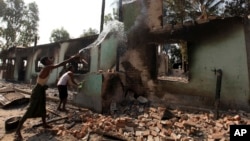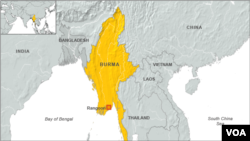Burmese officials say one person was killed and another 10 injured during the latest anti-Muslim riots that continue to edge closer to the country's largest city, Rangoon.
Police said Wednesday that a person died of his injuries following clashes a day earlier in the small town of Okkan, which lies less than 100 kilometers north of Rangoon.
Residents say a group of at least 300 Buddhists armed with makeshift weapons swept through the area late Tuesday, destroying Muslim-owned properties.
U Aung Min, a religious teacher at a mosque in the area, said he recognized some of the attackers.
"Who did this? There are some people from the group that are from some villages nearby or villages from far away," he said. "We are familiar with their faces."
Officials say at least 157 homes were destroyed, while at least two mosques were seriously damaged. Although many said police were not initially present to stop the violence, a heavy security presence was later reported in Okkan.
Similar violence killed 43 people in late March in the central Burmese town of Meikhtila. The anti-Muslim violence later spread south, but the riots so far appear to have stayed clear of Rangoon.
Last month, a fire at a Muslim school in Rangoon killed 13 students. Officials said an electrical problem was responsible for the blaze, but many Muslims in the community suspect arson is to blame.
The violence is the worst since late last year, when over 200 people were killed in western Rakhine state during clashes between Buddhists and Muslim Rohingya, an ethnic group that rights groups say is widely discriminated against in Burma.
Earlier this week, Human Rights Watch said authorities were involved in "ethnic cleansing" against the Rohingya, most of whom are denied citizenship and many other basic rights. The New York-based group has accused the military of failing to stop, and sometimes partaking in, the violence. That claim is disputed by the government.
Tens of thousands of Rohingya Muslims remain displaced, with many living in squalid refugee camps. Though rights groups have warned the situation threatens to turn into a semi-permanent state of segregation, a government report this week said keeping the communities apart is the best solution to stop the violence.
Police said Wednesday that a person died of his injuries following clashes a day earlier in the small town of Okkan, which lies less than 100 kilometers north of Rangoon.
Residents say a group of at least 300 Buddhists armed with makeshift weapons swept through the area late Tuesday, destroying Muslim-owned properties.
U Aung Min, a religious teacher at a mosque in the area, said he recognized some of the attackers.
"Who did this? There are some people from the group that are from some villages nearby or villages from far away," he said. "We are familiar with their faces."
Officials say at least 157 homes were destroyed, while at least two mosques were seriously damaged. Although many said police were not initially present to stop the violence, a heavy security presence was later reported in Okkan.
Similar violence killed 43 people in late March in the central Burmese town of Meikhtila. The anti-Muslim violence later spread south, but the riots so far appear to have stayed clear of Rangoon.
Last month, a fire at a Muslim school in Rangoon killed 13 students. Officials said an electrical problem was responsible for the blaze, but many Muslims in the community suspect arson is to blame.
The violence is the worst since late last year, when over 200 people were killed in western Rakhine state during clashes between Buddhists and Muslim Rohingya, an ethnic group that rights groups say is widely discriminated against in Burma.
Earlier this week, Human Rights Watch said authorities were involved in "ethnic cleansing" against the Rohingya, most of whom are denied citizenship and many other basic rights. The New York-based group has accused the military of failing to stop, and sometimes partaking in, the violence. That claim is disputed by the government.
Tens of thousands of Rohingya Muslims remain displaced, with many living in squalid refugee camps. Though rights groups have warned the situation threatens to turn into a semi-permanent state of segregation, a government report this week said keeping the communities apart is the best solution to stop the violence.






